Centre for Policy Development's Blog, page 24
March 25, 2019
Terry Moran AC delivers Jim Carlton Integrity Lecture on ‘The next long wave of reform — where will the ideas come from?’
In my view, a big problem is the absence of agreement on the big ideas to drive the next long wave of policy reform designed around an Australia which citizens aspire to live in.
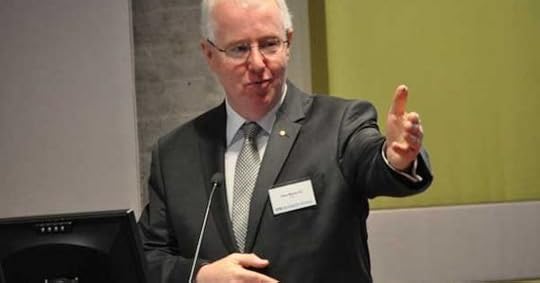
CPD Chairperson Terry Moran AC
CPD Chairperson Terry Moran AC delivered the Jim Carlton Integrity Lecture 2019 on ‘The next long wave of reform — where will the ideas come from?’ at the Accountability Roundtable in Melbourne on 25 March. In his address, Terry laid out how he views the next wave of reform and the key steps he thinks must be taken as part of David Thodey’s review of the Australian Public Service. The speech was timely given David Thodey’s speech in Canberra last week.
Terry drew on CPD’s attitudes research over the past two years about the public’s view of Australia’s democracy. The results suggest that, to a varying extent, institutions, big ideas and delivery are now weak reflections of the axis of our democratic system – the views and expectations Australians have of their democracy.
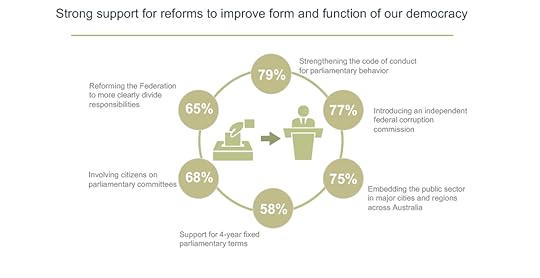
Results from CPD’s 2017 attitudes research.
Terry drew on the ‘missions mindset’ described by Mariana Mazzucato on her Australian tour in December 2018. He shared his concern about the absence of agreement on the big ideas to drive the next long wave of policy reform designed around an Australia which citizens aspire to live in. His view is Australians want government to seek tailored, smart, creative solutions that draw on the experience of civil society, business and the public. They want missions and moonshots, such as:
Decarbonizing our economy;
Equipping our workforce and businesses with the capabilities to succeed in the new digital era;
Finding a new configuration of national security and diplomatic relationships for Australia as China and the United States struggle for dominance in our region;
A new emphasis on successful integration of new national, ethnic and religious communities into an Australia which has dropped the ball on settlement;
Empowering indigenous communities and embracing the Uluru Statement from the Heart;
An approach to national economic development which emphasizes goals of national competitiveness, regional integration and a fuller embrace of the region and its peoples in all their diversity; and
Subsidiarity, driven by a respect for individuals, families and communities seeking to find comfort and support in local connection within new approaches to governance and service delivery.
The starting point for Australian missions, Terry argued, is to reinvest in the creative elements of our public services, enriched by direct experience of the services that Australians expect government to provide. He expressed his hope that local approaches are backed and our obsession with the contracted state ends because of David Thodey’s review of the Australian Public Service.
Just as the APS was rebuilt for previous reform waves, Terry argued it would need to be rebuilt once more for the next set of missions. He underlined five proposals necessary to support the future of the APS:
To return to a public service able to provide frank advice to Ministers while securing continuity in our system of Government, including security of tenure for the most senior public servants;
For a stronger Public Service Commission (PSC), which brings together many of the functions scattered when the Public Service Board was abolished, to be legislated;
To formalise the role of Ministerial Advisers to make them accountable for their actions, able to be summoned before Parliamentary Committees and investigated by integrity agencies;
For an Integrity Commission with a broad brief to investigate maladministration, deficiency in policy advice and incompetence in program management; and
For an overhaul of laws governing political donations and the early release of information about donations.
He concluded his speech stating all of us have a responsibility to advocate for a debate about the next wave of big ideas — the missions we can all support.
Terry Moran AC has had an extraordinary career in public administration and is Chancellor of Federation University, Chair of the Centre for Policy Development, Chair of the Barangaroo Delivery Authority and Chair of the Melbourne Theatre Company. He served as Director-General of Education in Queensland 1998-2000, Secretary of the Department of Premier and Cabinet in Victoria 2000-08 and Secretary of the Commonwealth Department of Prime Minister and Cabinet 2008-11.
Key Documents
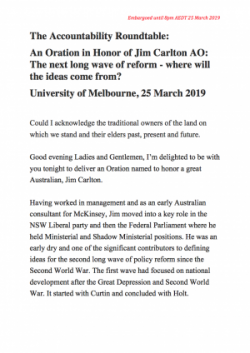
Full speech
Media coverage
The next long wave of reform — where will the ideas come from?, Terry Moran AC, The Mandarin, 25 March 2019
Bring ministers’ advisers under greater scrutiny: ex-PM&C chief, Doug Dingwall, The Canberra Times, 26 March 2019
Mornings with Jon Faine, ABC Radio Melbourne, 26 March 2019
The post Terry Moran AC delivers Jim Carlton Integrity Lecture on ‘The next long wave of reform — where will the ideas come from?’ appeared first on Centre for Policy Development.
March 24, 2019
Heavyweights now speaking with one voice on climate change risks | Op-ed Sam Hurley | March 2019
Published in The Sydney Morning Herald on 24 March 2019
Climate change is reshaping Australia’s economy and financial system, and its consequences will be devastating without urgent action. If that message had not hit home, the Reserve Bank of Australia’s intervention last week made it clear.
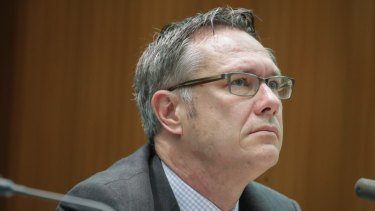
Reserve Bank deputy governor Guy Debelle focused on how climate change can complicate setting interest rates. CREDIT:ALEX ELLINGHAUSEN
In last week’s address to a Centre for Policy Development public forum, RBA Deputy Governor Dr Guy Debelle said climate change will have “first order economic effects” and could have major consequences for financial stability if transitions are disorderly and abrupt.
Hot on Debelle’s heels, APRA subsequently released its first climate risk stocktake, calling for banks, insurers and superannuation funds to step up their responses. Its survey of 38 large entities suggests many are dragging the chain on climate-related financial analysis and disclosure.
The laggards can expect pressure to mount. APRA, its international counterparts and investors have signalled they want a little less conversation and a lot more action.
Looking beyond the headlines, there are three takeaways from recent, co-ordinated interventions by the RBA and other regulators on climate change.
First, for the regulators, this is about economics and not politics. The Reserve Bank, ASIC and APRA now speak with one voice on the serious economic challenges climate change poses.
The RBA’s statement built on equally powerful markers laid down by APRA’s Geoff Summerhayes in 2017 and ASIC’s John Price in 2018. Just as the RBA is considering how climate influences monetary policy, APRA and ASIC are examining the implications for financial stability and whether companies, investors and directors are doing enough to respond.
This clear public stance matters. In an era defined by a cautious (and often downright craven) approach to climate in politics and business, influential independent voices have stepped up in a way that is reverberating in boardrooms around the country.
This is no small thing. Summerhayes and Debelle were both appointed to their current positions by a federal treasurer (now Prime Minister) notorious for waving a lump of coal around in parliament. Their statements are reminders that, when we get it right, good governance and strong institutions trump politics.
The second key takeaway is that policy matters enormously. Dr Debelle emphasised that “the policy environment has a key effect as well as the climatic environment” when it comes to the economic impacts of climate change. He warned that decisions taken now could “limit or eliminate” our ability to manage future climate impacts.
APRA’s Geoff Summerhayes has also warned that policy delay or inaction, rather than minimising risks for businesses and the economy, could simply make these risks “greater and more abrupt.”
These are not partisan points. They are sober reminders that policy failures make climate risks even harder to manage for regulators and businesses alike.
Dr Debelle also made a subtler observation: policies to support a smooth economic transition must carefully balance impacts across society. He used the example of trade policy, where overall gains from trade could have been used to compensate those who lose out. As he flatly points out, “In practice, the compensation has generally not occurred.”
Adjustment costs from reform have “fallen on groups that have not received their share of the benefits.” Over time, this failure has not just undermined support for free trade – it has also contributed to a destabilising turn in politics.
Here the speech provides a crucial insight: managing the distributional aspects of climate policy will be critical to sustaining good outcomes.
The third key takeaway is that we ignore international developments at our peril. Dr Debelle cited policy-driven changes in China’s demand for Australian resources as a present-day example of climate risk for Australia. There are many others.
Global finance is being reshaped by new standards, regulations, financial products and markets to support a zero-carbon transition. Australia needs to access these markets – for goods, for services and for capital – to power its economy. But it will get harder to do so on favourable terms unless we lift our game, and our ambitions, on climate and sustainability.
Our regulators are on the case: the RBA has joined the global central banks’ Network for Greening the Financial System, while APRA is a prominent voice in the global Sustainable Insurance Forum.
It is time the government itself engaged seriously in the sustainable finance agenda, too, rather than sitting on the sidelines.
Sam Hurley is Policy Director at the Centre for Policy Development, which hosted last week’s speech by Dr Guy Debelle and earlier statements by ASIC and APRA.
The post Heavyweights now speaking with one voice on climate change risks | Op-ed Sam Hurley | March 2019 appeared first on Centre for Policy Development.
March 21, 2019
Latest eNews
Dear CPD follower
Before we share our latest news, we want to extend our love and sincere condolences to our New Zealand friends and family impacted by the horrific killings in Christchurch. Their compassionate response has been a lesson for all of us on this side of the Tasman Sea. We grieve with them.
Below you’ll find a full CPD update. There have been some big milestones on climate change and a new report we’ve led about the situation in the world’s largest refugee camp. Read on for news about:
CPD welcomes new CPD Fellow, Richard Bolt
Other highlights
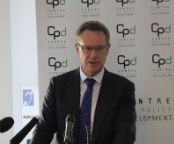 Last week CPD hosted a public forum on climate change and the economy featuring a landmark speech by Dr Guy Debelle, Deputy Governor of the Reserve Bank of Australia (RBA). It was the third in a series of CPD forums held at MinterEllison Lawyers in Sydney, and the RBA’s first dedicated speech on climate change.
Last week CPD hosted a public forum on climate change and the economy featuring a landmark speech by Dr Guy Debelle, Deputy Governor of the Reserve Bank of Australia (RBA). It was the third in a series of CPD forums held at MinterEllison Lawyers in Sydney, and the RBA’s first dedicated speech on climate change.
Following his remarks, Dr Debelle was joined for a panel discussion by Kate Mackenzie (European Climate Foundation), Blair Comley PSM (former Secretary of the Department of Climate Change and Energy Efficiency) and Katharine Tapley (Head of Sustainable Finance, ANZ).
Dr Debelle’s speech was covered widely across Australia and overseas. You can find links to the speech, the audio of the forum, and the roundup of media coverage of this full-house event here. APRA has followed Dr Debelle’s speech by releasing its first climate risk survey this week, in which CPD’s work featured prominently.
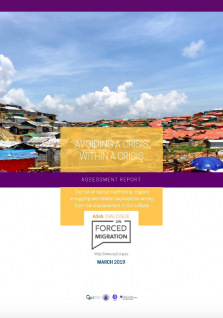 Between March and November 2018, CPD, as part of the Secretariat of the Asia Dialogue on Forced Migration (ADFM), conducted an assessment of the risk of human trafficking, migrant smuggling and related exploitation arising from the displacement of the Rohingya in Cox’s Bazar. The assessment report – Avoiding a Crisis Within a Crisis – finds that the conditions for high levels of trafficking, smuggling and related exploitation are present and will only intensify with time, affecting both the Rohingya and Bangladeshi populations. The assessment makes recommendations for regional and local responses to address these risks. You can find the full report, a summary policy brief and media coverage by the Jakarta Post here.
Between March and November 2018, CPD, as part of the Secretariat of the Asia Dialogue on Forced Migration (ADFM), conducted an assessment of the risk of human trafficking, migrant smuggling and related exploitation arising from the displacement of the Rohingya in Cox’s Bazar. The assessment report – Avoiding a Crisis Within a Crisis – finds that the conditions for high levels of trafficking, smuggling and related exploitation are present and will only intensify with time, affecting both the Rohingya and Bangladeshi populations. The assessment makes recommendations for regional and local responses to address these risks. You can find the full report, a summary policy brief and media coverage by the Jakarta Post here.
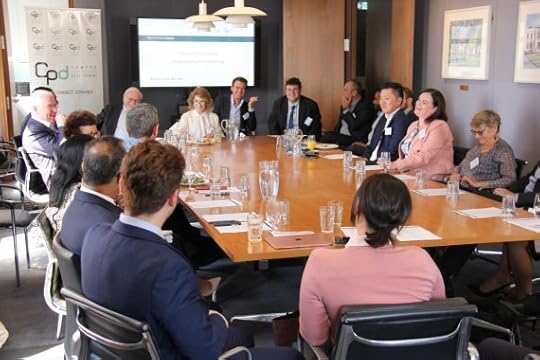 On 14 March, we hosted our first ANU-CPD Policy Dialogue for 2019 on the topic of ‘Political Communication: selling broadsheet policy in a Twitter age’. It featured opening remarks from Professor Frank Bongiorno AM (Professor of History, ANU), Maxine McKew (Graduate School of Education, University of Melbourne), and Michael Rowland (ABC News Breakfast). They weaved the personal, practical and historical threads of the topic together brilliantly, and kickstarted an entertaining and thought-provoking discussion. You can find more details about the event here.
On 14 March, we hosted our first ANU-CPD Policy Dialogue for 2019 on the topic of ‘Political Communication: selling broadsheet policy in a Twitter age’. It featured opening remarks from Professor Frank Bongiorno AM (Professor of History, ANU), Maxine McKew (Graduate School of Education, University of Melbourne), and Michael Rowland (ABC News Breakfast). They weaved the personal, practical and historical threads of the topic together brilliantly, and kickstarted an entertaining and thought-provoking discussion. You can find more details about the event here.
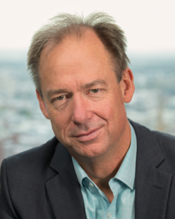 We’re thrilled to announce that Richard Bolt has joined CPD as a Fellow. Richard recently finished up as Secretary of the Victorian Department of Economic Development, Jobs, Transport and Resources in December 2018 and is now Vice President Strategy and Innovation at Swinburne University. He has previously been Secretary for primary industries, and education and early childhood. We look forward to working with Richard collaboratively on transformative policy changes, especially concerning Australia’s low carbon energy transition. Welcome Richard!
We’re thrilled to announce that Richard Bolt has joined CPD as a Fellow. Richard recently finished up as Secretary of the Victorian Department of Economic Development, Jobs, Transport and Resources in December 2018 and is now Vice President Strategy and Innovation at Swinburne University. He has previously been Secretary for primary industries, and education and early childhood. We look forward to working with Richard collaboratively on transformative policy changes, especially concerning Australia’s low carbon energy transition. Welcome Richard!
Other Highlights
* CPD Board Member Sam Mostyn returned to her alma mater, the Australian National University, on 8 March to deliver the 2019 International Women’s Day lecture. You can find a full video recording of her speech here.
* CPD’s attitudes research on what Australians want from our democracy was featured in the latest Quarterly Essay. Australia Fair – Listening to the Nation by Rebecca Huntley.
* CPD Senior Adviser Arjuna Dibley presented at the World Bank’s Carbon Pricing Leadership Coalition Research Conference in February in New Delhi.
* Our CEO Travers McLeod shared his thoughts on leadership for millennials in The Australian’s monthly business magazine last week.
* CPD Board Member Sam Mostyn was featured as one of the 50 most influential women in Australian sport in The Sydney Morning Herald.
* CPD fellow Peter Hughes assessed Australia’s immigration policy in a two-part series on Pearls and Irritations, touching on CPD’s Asia Dialogue on Forced Migration.
The post Latest eNews appeared first on Centre for Policy Development.
March 19, 2019
Avoiding a Crisis within a Crisis | ADFM Trafficking Risk Assessment | March 2019

Photo: Travers McLeod
Between March and November 2018, the Secretariat of the Asia Dialogue on Forced Migration (ADFM) conducted an assessment of the risk of human trafficking, migrant smuggling and related exploitation arising from the Rohingya displacement in Cox’s Bazar.
The assessment report – Avoiding a Crisis Within a Crisis – finds that the conditions for high levels of trafficking, smuggling and related exploitation are present and will only intensify with time, affecting both the Rohingya and Bangladeshi populations.
The assessment recognises that Bangladesh and its international partners have delivered a generous and effective humanitarian response so far, but more needs to be done to support actors on the ground, particularly in addressing protection concerns.
The durable solution to this crisis lies in the safe, dignified, voluntary and sustainable repatriation of the Rohingya to Rakhine State in Myanmar. The Government of Myanmar must continue to work towards this goal.
The assessment highlights the presence of risk factors for trafficking, smuggling and exploitation in Cox’s Bazar. To address these risk factors, the assessment makes recommendations within four policy directions, namely:
Securing a durable solution in Myanmar;
Supporting development in Cox’s Bazar and Rakhine State;
Strengthening counter-trafficking efforts on both sides of the border; and
Improving living conditions for the Rohingya, and the ability of actors on the ground to respond effectively.
Movements of people are already increasing, including by boat, and these are affecting the whole region. Active involvement and coordination of regional actors – such as ASEAN and the Bali Process – in tackling this challenge will make a significant difference to the response on the ground.
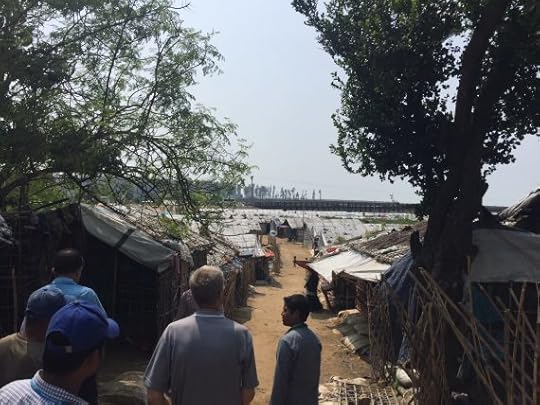
Photo: Travers McLeod
The risk assessment was first proposed at the sixth meeting of the ADFM in March 2018. The Secretariat outlined emerging findings of the assessment and further plans to senior officials at the Bali Process Ministerial Conference and Senior Officials Meeting in August 2018, and a preliminary version of the assessment was presented for feedback at the seventh ADFM meeting in November 2018.
The ADFM is grateful for the support of the Bali Process Regional Support Office, the Office of the United Nations High Commissioner for Refugees and the International Organisation for Migration, and for the cooperation of the Bangladesh Ministry of Foreign Affairs and Ministry of Home Affairs throughout the assessment and in the months since.
Key Documents

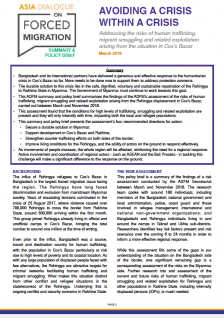
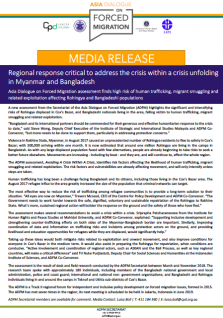
Full Risk Assessment
Summary & Policy Brief
Media Release
The ADFM is a Track II regional forum for independent and inclusive policy development on forced migration issues, formed in 2015. Learn more about the work of the ADFM here.
Media Coverage
Rohingya ‘at risk’ of trafficking, Dian Septiari, The Jakarta Post, 20 March 2019
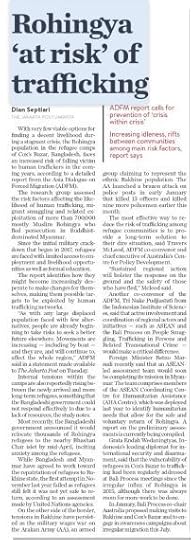
The post Avoiding a Crisis within a Crisis | ADFM Trafficking Risk Assessment | March 2019 appeared first on Centre for Policy Development.
March 17, 2019
Political communication: selling broadsheet policy in a twitter age I ANU-CPD Policy Dialogue I March 2019
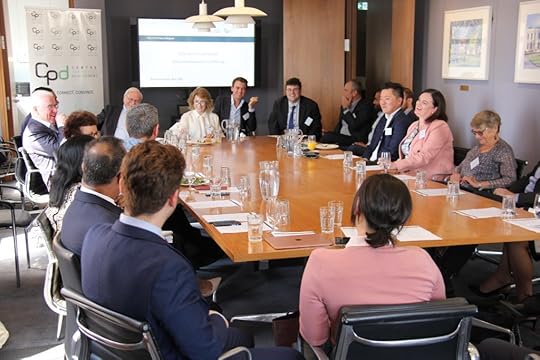
Full audio recording available soon.
On 14 March, we hosted the first ANU-CPD Policy Dialogue for 2019 on the topic of Political communication: selling broadsheet policy in a Twitter age’, featuring opening remarks from Professor Frank Bongiorno AM (Professor of History, ANU); Maxine McKew (Graduate School of Education, University of Melbourne); and Michael Rowland (Co-presenter, ABC News Breakfast).
The roundtable was moderated by ANU Chancellor and former Foreign Minister, the Hon Gareth Evans AC QC.
“Policymakers are going to have to get much better at storytelling if they are ever going to sell complex policy to a seemingly ever-shorter-attention-span electorate”, Evans has often reminded participants at previous Policy Dialogues. Last December, at CPD’s John Menadue Oration, Professor Mariana Mazzucato spoke about the need for bold narratives to drive more ambitious policy-making.
This Policy Dialogue was an opportunity to test these claims, and discuss the need for better narratives and communication methods if simplistic, reflexive policymaking is to be avoided.
Opening remarks (full audio of opening remarks here)
Maxine McKew opened the discussion describing how the policy and media landscape has changed over the last decades. New, well-funded, disrupting actors making use of the latest technologies have been penetrating the public sphere. These actors were the driving forces behind Brexit and the last U.S. election and are seeking some sort of anarchic chaos in our democracies. The key question that Maxine raised was how you conduct public policy debates with some integrity in the face of these well-funded disrupters.
Frank Bongiorno then looked at the historical background of political communication. He observed that failed political storytelling is one of our biggest policy challenges today. History has shown that almost all successful political leaders such as Nelson Mandela have been superior storytellers who knew how to craft a narrative. In contrast, Frank believes that today’s politicians are putting remarkably little effort into crafting their stories.
Michael Rowland offered some insights into 30 years on the media frontline and gave his view on how the 24-hour news cycle and social media have fast-tracked the policy debate in Australia in a negative way. He touched on the toxic nature of Twitter regarding particular policy issues such as Indigenous affairs and matters of race, and warned that social media can easily turn facts on their head which make a serious policy debate on these platforms impossible.
The following discussion touched on:
The pressure on policymakers and other leaders to publicly comment on any topic of the current news cycle.
Politicians’ unwillingness to speak beyond their highly-politicised talking points, and the common habit of avoiding a journalist’s question.
The importance of other ways than via media for politicians to communicate with the community.
The effect of the lack of traditional media gatekeepers on quality journalism.
The potential to engage everyday Australians more actively in public policy debates.
Participants:
Abul Rizvi (Former Official, Commonwealth Department of Immigration), Arden Baker (Account Executive, Civic Group), Ben Davison (Chief of Staff, ACTU), Benson Saulo (Head of Partnerships, Australian Unity), Bronwen Clark (Executive Officer, National Growth Areas Alliance), Eric Beecher (Chairman, Private Media), Frank Bongiorno AM (Professor of History, ANU College of Arts and Social Sciences, ANU), Gareth Evans AC QC (Chancellor, ANU), Jacqui Phillips (Director of Policy and Advocacy, Australian Council of Social Service), Jackie Yowell (Consulting Publisher and Editor), Jamila Rizvi (Author, presenter and political commentator), Kelly O’Shanassy (CEO, Australian Conservation Foundation), Luisa Boll (Communications and Events Officer, Lynne Haultain (Executive Director, Victoria Law Foundation), Jieh-Yung Lo (Executive Officer to Chancelor, ANU), Matthew Gordon (CEO, OurSay), Maxine McKew (University of Melbourne), Michael Rowland (Co-presenter, ABC News Breakfast), Michele Fonesca (Former Head of Community Engagement, Diversity & Inclusion, ABC), Niraj Lal (Presenter, ABC Sciencey), Peter Martin (Business and Economy Editor, The Conversation), Philip Le Liu (Councillor, City of Melbourne), Sarah Carter (Manager, Australian Aid and Parliament Project, Save the Children Australia), Sean Sammon (CEO, Bastion Engage), Simon Holmes à Court (Energy transition Specialist), Travers McLeod (CEO, Centre for Policy Development), Wesa Chau Director (Cultural Intelligence).
Speaker profiles:
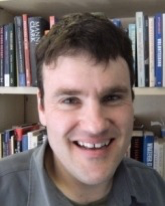 Professor Frank Bongiorno AM
Professor Frank Bongiorno AM
Frank Bongiorno is an Australian labour, political and cultural historian. He is Professor of History at ANU College of Arts and Social Sciences, Australian National University.
He has served on the New South Wales Arts Advisory Council and as a member of the New South Wales Ministry of the Arts Literature and History Committee, including as its chair for three years. He is an Editorial Board member of Labour History, Journal of Australian Studies, Australian Journal of Politics and History and History Australia, and was co-editor of History Australia from 2013 to 2015.
 Maxine McKew
Maxine McKew
Maxine McKew is an author and an Honorary Professor of the Melbourne Graduate School of Education at the University of Melbourne. She also produces a podcast called Talking Teaching.
Maxine’s background traverses both journalism and politics. When she left journalism and made the switch to politics, she wrote herself into the Australian history books by defeating Prime Minister John Howard in the Sydney seat of Bennelong. In government she was both parliamentary secretary for early childhood and later, for regional development and local government. Maxine is a director of Per Capita and the John Cain Foundation. In 2015 she was appointed to serve on the board of the State Library of Victoria and re-appointed for a further term in 2018.
 Michael Rowland
Michael Rowland
Michael Rowland has presented ABC News Breakfast since the launch of ABC News in 2010.
Michael was previously North America correspondent and during his posting covered stories including the election of Barack Obama as US President, the outbreak of the global financial crisis, the Virginia Tech massacre and David Hicks release from Guantanamo Bay. Before going to the United States, he was Lateline‘s finance correspondent and also covered business and economics for a range of other ABC TV and radio outlets.
The post Political communication: selling broadsheet policy in a twitter age I ANU-CPD Policy Dialogue I March 2019 appeared first on Centre for Policy Development.
Protected: Political communication: selling broadsheet policy in a twitter age I ANU-CPD Policy Dialogue I March 2019
This content is password protected. To view it please enter your password below:
Password:
The post Protected: Political communication: selling broadsheet policy in a twitter age I ANU-CPD Policy Dialogue I March 2019 appeared first on Centre for Policy Development.
March 14, 2019
Crisis within a Crisis | TRAFFICKING RISK ASSESSMENT | February 2019
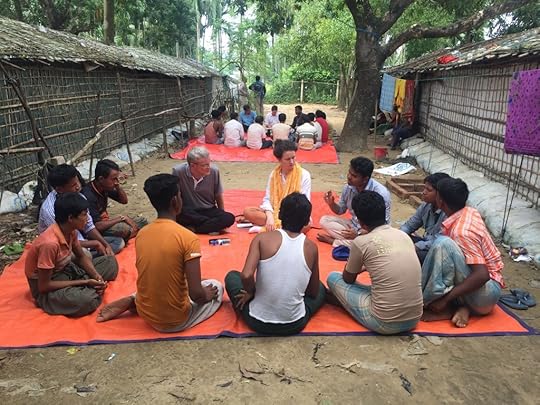
Between March and October 2018, the Asia Dialogue on Forced Migration (ADFM) conducted an assessment of the risks of human trafficking, migrant smuggling and related exploitation arising from the Rohingya displacement in Cox’s Bazar.
Bangladesh and its international partners have delivered a generous and effective humanitarian response so far, but more needs to be done to support actors on the ground in addressing protection concerns.
This assessment found that the preconditions for high levels of trafficking, smuggling and related exploitation are present and they will only intensify with time, affecting both the Rohingya and Bangladeshi populations. Accordingly, it’s not a case of if large scale movement will occur, but when.
As movements of people increase, the whole region will be affected, reinforcing the need for a regional response. Active involvement and coordination of regional actors – such as ASEAN and the Bali Process – in tackling this challenge will make a significant difference to the response on the ground.

This policy paper presents four key directions for action to address these risks effectively:
1. SECURE A DURABLE SOLUTION IN MYANMAR
The most effective way of reducing the risk of trafficking among refugee communities is to secure a long-term solution to their situation. Myanmar should continue to work towards safe, voluntary and sustainable repatriation, respecting and implementing the landmark agreements reached with the Government of Bangladesh. For the vast majority of Rohingya, they just want to go home. It is important that process not be rushed. The international community, including bilateral donors, and regional agencies, should continue to support Myanmar in its realisation of this goal.
2. SUPPORT DEVELOPMENT IN COX’S BAZAR AND RAKHINE
Bangladesh has made laudable efforts to accommodate the Rohingya within its territory while also facing its own development challenges. Cox’s Bazar was already one of the least developed districts in Bangladesh and existing infrastructure is struggling to cope with the higher numbers of international and local humanitarian workers now based in the area. Due to its coastal location, the district it particularly vulnerable to climate- induced displacement. It also has the lowest net education enrolment rate in Bangladesh, indicating that the area could benefit from a dedicated investment in education. Medium to long term investment in infrastructure would also reduce tensions and improve outcomes for both locals and refugees living there. Development needs are also prevalent in Rakhine State and should be addressed as part of the regional response to the crisis.
3. STRENGTHEN COUNTER-TRAFFICKING EFFORTS ON BOTH SIDES OF THE BORDER
Capacity building and technical support for the counter- trafficking response in both Bangladesh and Myanmar would benefit host and displaced communities alike. As with many developing countries, there is the will to improve, but technical support and resources are inadequate to address the scale of the problem. Regional actors have a strong incentive to provide such support to both Bangladesh and Myanmar, as if movements of people do increase as we predict, the entire region will be affected. ASEAN and Bali Process resources and expertise can be brought to bear, as well as those of other bilateral and multilateral actors.
4. IMPROVE LIVING CONDITIONS FOR THE ROHINGYA, AND THE ABILITY OF ACTORS ON THE GROUND TO RESPOND EFFECTIVELY
Some of the restrictions on the displaced population are having the unintended consequence of exacerbating risks. Providing access to livelihood opportunities and education either in Bangladesh or elsewhere would not only benefit the local economy and decrease tensions with locals, but would also increase the preparedness of the displaced community for repatriation, as they would be able to build their resilience and skills. Further, to our knowledge, there is no coordinated data collection between Government and key international agencies in Cox’s Bazar. Sharing indicators and making them public should be resolved as a matter of urgency in order to identify trends and respond effectively.
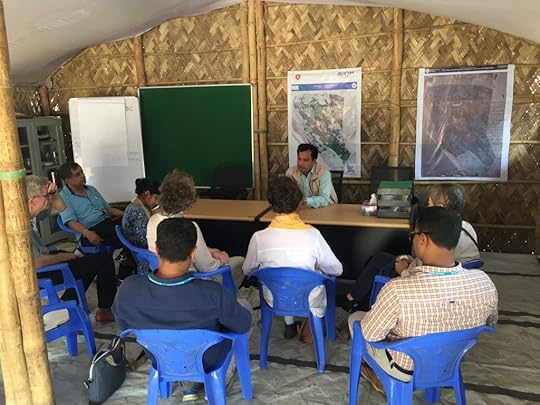
Key Documents
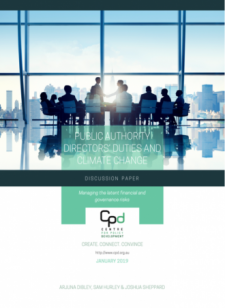
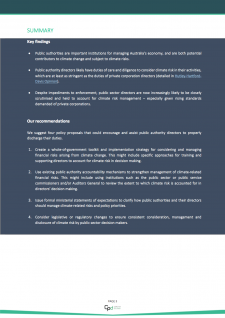
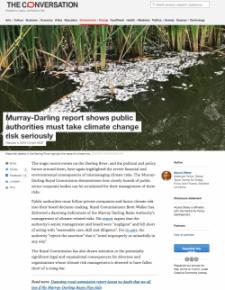
Full policy paper
Policy briefings
Media Release
Coverage and related reading
The post Crisis within a Crisis | TRAFFICKING RISK ASSESSMENT | February 2019 appeared first on Centre for Policy Development.
The young ones – Millennials get a bad rap but they’re focused on a future where they will have to live | Op-ed Travers McLeod | March 2019
Published in the Australian on Friday, 15 Mar 2019 – Page 30
The young ones
Millennials get a bad rap but they’re focused on a future where they will have to live
If the Who got baby boomers talkin’ ’bout their generation, millennials are joining Gang of Youths to ask what they can do if the fire goes out.
It’s tough being a millennial in a world built by boomers. Australian millennials are accused of being lazy, have less job security, are priced out of the housing market, and are blamed for spending too freely on coffee and smashed avo. American millennials are told they’re too socialist because they support free health care and a Green New Deal pushed by millennial congresswoman Alexandria Ocasio-Cortez .
I’ve got a confession. I only realised I’m a millennial when I was asked to write this piece about leadership for millennials and what we’ll want in 2030. The Pew Research Centre defines millennials as people born between 1981 and 1996. This means my four siblings, born from 1981 to 1991, are millennials too. And that’s one reason why I find the label a bit useless.
If millennials in one family can want different things for very good reasons, it’s impossible to generalise across communities and countries. Still, as the husband of a Kiwi millennial, and the father of a two-year-old girl, I see how much tougher life is for female millennials. The same goes for indigenous millennials, as Gamilaroi millennial Brooke Boney explained eloquently during the debate about Australia Day earlier this year.
Millennials can’t be pigeonholed but won’t be ignored. By 2025 we’ll make up 75 per cent of the global workforce. We won’t waste our time on muffin breaks but we’re not going anywhere. The way we get news, connect with our mates, try to find and keep jobs, decide what to eat and what to do, is already transforming the globe.
The millennials on my team want to work for organisations – public, private or community – with purpose. They want to work in teams that live their values. They want positive, long-term impact over profit. They want to protect the planet. The new dads want to be at home and with their kids as much as at the office. They want to work for organisations which encourage them to do just that. They aren’t alone.
What will we want in 2030? I can’t say what we’ll all want in 2030 more than the next millennial, but I can say what I think we’ll all need before we get there.
First we need decisive action to reduce carbon emissions. The latest authoritative report warns we have only until 2030 to avoid catastrophic global warming. Those alarm bells ring loudest for those who are youngest.
Second, we’ll need to renew our democracy and the purpose of our corporations. Our research has found Australians have a huge appetite to tackle our biggest challenges, boost equality and fairness for all, and drive long-term value creation. Many indigenous millennials have joined their forebears to back the Uluru Statement from the Heart. We need to support them to realise its aspirations.
Third, we’ll need leaders and bosses who put the public interest above self-interest and shareholder interest. We’ll need leaders who look like Australians, in all our diversity. They’ll need to make the globe work, not retreat from it. They’ll need to build coalitions, not battlelines, and achieve moonshots more daring than the one that launched Neil Armstrong’s giant leap for humankind 50 years ago. Achieving true and equal rights for women in a zero-carbon world is a must.
We live in an era of stark contrasts. The world has lifted more than a billion people out of poverty, but we’re less equal. We have fewer wars, but Australia is in its longest war. We’re healthier and we live longer, but each week in Australia a woman is killed by a current or former partner. Australia has had uninterrupted growth for 26 years, but we’ve barely begun to close the gap with the First Australians.
In this environment, it’s not enough to say this is the best time to be alive, even if the evidence — including a 2018 West Coast Eagles premiership — suggests that it is. With 12 years on the climate clock and stark contrasts on our doorstep, we need to embrace bold missions and big ideas together. If we can become a proud, smart nation of compassionate and sustainable communities engaged with each other and with Asia, we will create a future all generations can embrace.
Travers McLeod is chief executive of the Centre for Policy Development.
Copyright © 2019 The Australian
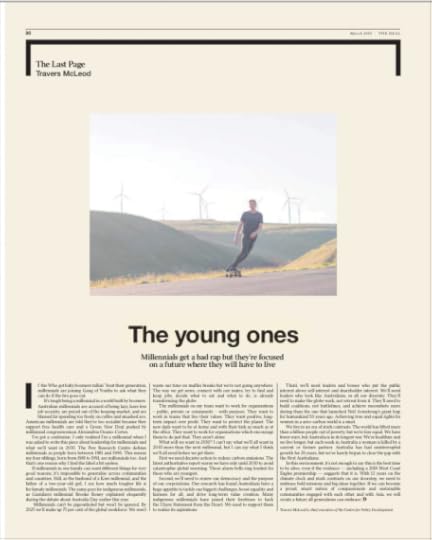
The post The young ones – Millennials get a bad rap but they’re focused on a future where they will have to live | Op-ed Travers McLeod | March 2019 appeared first on Centre for Policy Development.
Climate Change and the Economy with the RBA’s Guy Debelle | PUBLIC FORUM | March 2019
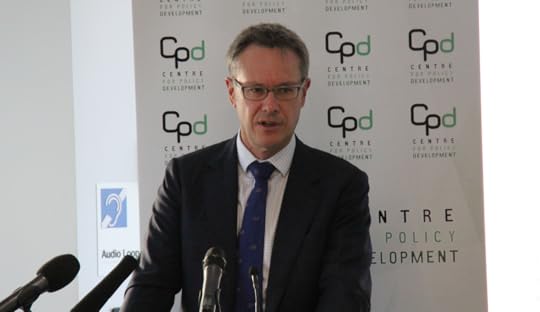
Dr Guy Debelle delivering keynote address at CPD public forum ‘Climate Change and the Economy’.
Full audio of the public forum available here.
Full speech by RBA Deputy Governor Dr Guy Debelle available here.
On 12 March, as part of our latest public forum on climate change and the economy, CPD hosted a landmark address by Reserve Bank of Australia (RBA) Deputy Governor Dr Guy Debelle on how climate change could impact growth, inflation and monetary policy.
The forum was the third in a CPD series, hosted by MinterEllison Lawyers, that has included a trifecta of statements on climate change by Geoff Summerhayes from ARPA (2017), John Price from ASIC (2018) and now Dr Guy Debelle from the RBA. The event was the first occasion that a senior official from the RBA has given a dedicated speech about climate change and the economy.
In his remarks, titled Climate change and the economy, Dr Debelle said that “both the physical impact of climate change and the transition are likely to have first-order economic effects.” He emphasised that climate change is a trend change — not a cycle that will wax and wane. He said climate could have major consequences for financial stability, especially if key transitions are disorderly or abrupt.
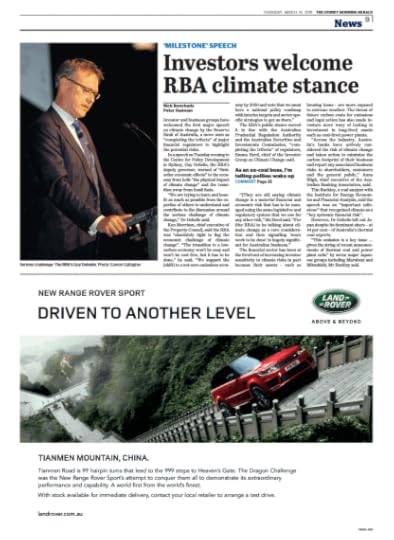
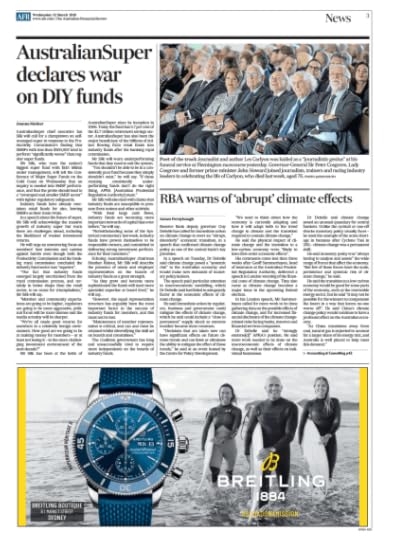
Following his remarks, Dr Debelle was joined for a panel discussion by Kate Mackenzie (European Climate Foundation), Blair Comley PSM (former Secretary of the Department of Climate Change and Energy Efficiency) and Katharine Tapley (Head of Sustainable Finance, ANZ). The panel discussion was moderated by CPD Policy Director Sam Hurley and accommodated several questions from the audience, including from Laura Tingle (ABC 7.30), Peter Hannam (Sydney Morning Herald) and Emma Herd (Investor Group on Climate Change). The final question of the night came from Susan Moylan-Coombs, the granddaughter of the first Governor of the Reserve Bank of Australia, Herbert Cole “Nugget” Coombs.
The event was opened by Stuart Johnson from MinterEllison Lawyers, who noted the close partnership between CPD and MinterEllison in producing the Hutley-Hartford-Davis opinion on directors’ duties and climate change, and this series of public forums.
Dr Debelle was introduced by CPD’s CEO, Travers McLeod who highlighted other pivotal speeches on the issue by regulators and central banks in recent years, starting with Mark Carney, Governor of the Bank of England, who described climate change as the ‘tragedy of the horizon’ in September 2015. Until then, company boards and financial market regulators had given climate change little attention. Travers acknowledged other people and organisations central to lifting ambition on climate change, some of whom attended the CPD forum, such as Emma Herd from the Investor Group on Climate Change, Ian Learmonth from the Clean Energy Finance Corporation, David Atkin from Cbus, Zoe Whitton from Citi Australia — among others.
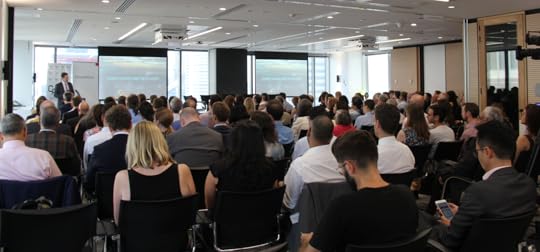
CPD CEO Travers McLeod introducing Dr Guy Debelle at CPD public forum ‘Climate Change and the Economy’.
In his speech, Dr Debelle stated
“the economy is changing all the time in response to a large number of forces. But few of these forces have the scale, persistence and systemic risk of climate change.”
On the physical impacts of climate change, Dr Debelle said that
“we need to reassess the frequency of climate events. In addition, we need to reassess our assumptions about the severity and longevity of the climatic events.”
He also discussed the importance of effective climate policy:
“The policy environment has a key effect as well as the climatic environment, decisions that are taken now can have significant effects on future climate trends and can limit or eliminate the ability to mitigate the effect of those trends.”
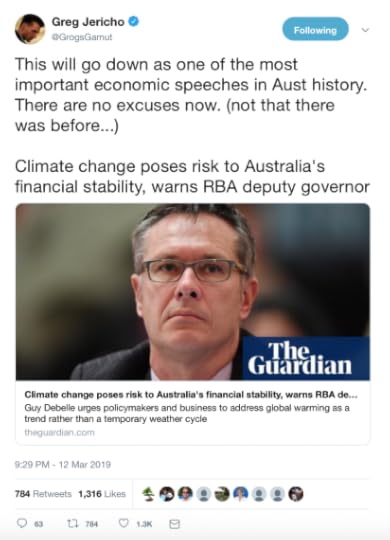
“Financial stability will be better served by an orderly transition rather than an abrupt disorderly one,” Dr Debelle said.
He strongly endorsed the need for businesses to implement the recommendations of the Task Force for Climate-related Financial Disclosures, emphasising the important role of scenario analysis.
The Reserve Bank’s intervention is another crucial step on climate change by Australia’s leading financial and economic regulators, following earlier public statements by APRA and ASIC, hosted by CPD in 2017 and 2018 respectively, on how climate change could affect profitability, financial system stability and corporate governance.
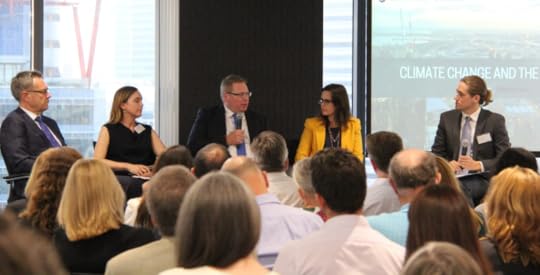
Panellists: Dr Guy Debelle, Kate Mackenzie, Blair Comley PSM, Katharine Tapley, Sam Hurley.
The panel warmly welcomed Dr Debelle’s speech. Katharine Tapley described it as a ‘waymarker’, stressed how climate change is high up on her clients’ concerns and affirmed the rapid growth of green finance. Blair Comley highlighted the importance of (government) policy, and of information provision and access. Kate Mackenzie stressed the limits to the remaining time window for action and touched on the implications of climate change on the housing market.
CPD Chair Terry Moran AC closed the night with a vote of thanks to the panellists and to Dr Debelle.
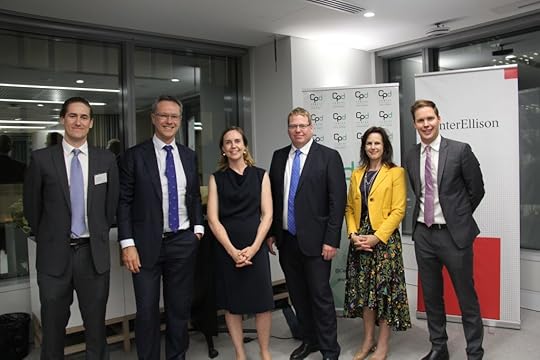
Sam Hurley, Dr Guy Debelle, Kate Mackenzie, Blair Comley PSM, Katharine Tapley and Travers McLeod.
The public forum was at capacity — booked out a month ahead of the event with a long waiting list — indicating the enormous public interest in and relevance of the event.
CPD would like to thank Sarah Barker, Stuart Johnson and the team at MinterEllison for hosting the event, and panellists and audience who contributed to an engaged and candid discussion.
Key Documents
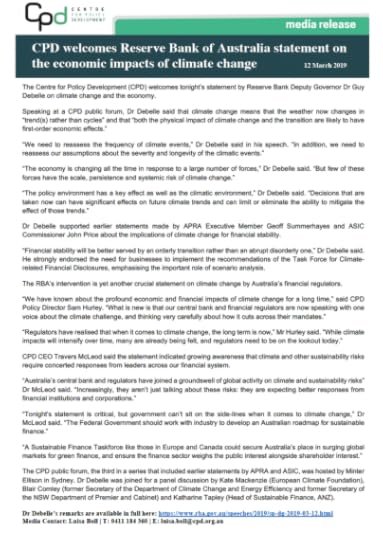
Media release
Media coverage
Reserve bank deputy governor gives speech on the economic impact of climate change, ABC 730 program, 12 March 2019
Climate change costs will have knock-on effects for interest rates, Reserve Bank warns, Laura Tingle, ABC, 12 March 2019
‘Change now or pay later’: RBA’s stark warning on climate change, Erik Bagshaw and Nick Bonyhady, Sydney Morning Herald, 12 March 2019
RBA warns of ‘abrupt, disorderly’ effects of climate change, James Fernyhough and Bo Seo, Australian Financial Review, 12 March 2019
RBA warns on climate fallout, Michael Roddan, The Australian, 12 March 2019
Climate change poses risks to Australia’s financial stability, warns RBA deputy governor, Katharine Murphy, The Guardian, 12 March 2019
The Reserve Bank has warned the challenges of climate change threaten Australia’s financial stability Rosemary Bolger, SBS News, 13 March 2019
RBA warns of threats to financial stability from climate change, Fran Kelly, ABC RN Breakfast, 13 March 2019
RBA boss calls for urgent action on climate to avoid economic calamity, Samantha Maiden, The New Daily, 13 March 2019
Guy Debelle: climate change and the economy, Guy Debelle, The Mandarin, 13 March 2019
RBA deputy warns climate change a threat to Australian economy, Peter Ryan, ABC AM, 13 March 2019
Milestone’ RBA climate speech seen as ‘changing the conversation, Peter Hannam, Sydney Morning Herald, 13 March 2019
What the Reserve Bank did — and didn’t — say about climate change, Bernad Keane, Crikey, 13 March 2019
Related reading
Climate change and the economy, speech by RBA Deputy Governor Dr Guy Debelle, March 2019.
Climate change, speech by ASIC Commissioner John Price, June 2018
Climate horizons: scenario and strategies for managing climate risk, CPD Report, June 2018
The weight of money: a business case for climate risk resilience, APRA Executive Member Geoff Summerhayes, November 2017
CPD roundtable on directors duties, climate risks and sustainability, October 2016
Legal opinion on directors duties and climate change, Noel Hutley SC and Sebastian Hartford-Davis, October 2016
The post Climate Change and the Economy with the RBA’s Guy Debelle | PUBLIC FORUM | March 2019 appeared first on Centre for Policy Development.
March 11, 2019
Climate Change and the Economy with the RBA’s Guy Debelle | PUBLIC FORUM | March 2019
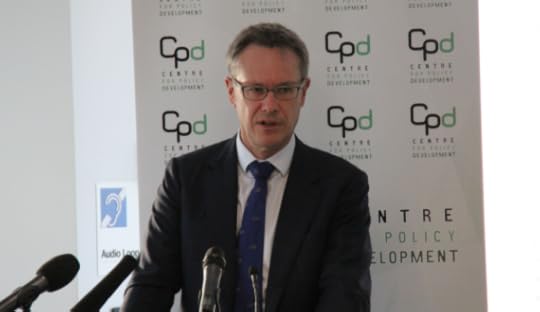
RBA Deputy Governor Dr Guy Debelle at CPD public forum, MinterEllison.
On 12 March, as part of our latest public forum on climate risk and sustainable finance, CPD hosted a keynote address by Reserve Bank of Australia Deputy Governor Dr Guy Debelle on how climate change could impact growth, inflation and monetary policy.
In his remarks, titled Climate change and the economy, Dr Debelle said that “both the physical impact of climate change and the transition are likely to have first-order economic effects.”
“The economy is changing all the time in response to a large number of forces” Dr Debelle said. “But few of these forces have the scale, persistence and systemic risk of climate change.”
On the physical impacts of climate change, Dr Debelle said that “we need to reassess the frequency of climate events. In addition, we need to reassess our assumptions about the severity and longevity of the climatic events.”
He also discussed the importance of effective climate policy. “The policy environment has a key effect as well as the climatic environment,” Dr Debelle said. “Decisions that are taken now can have significant effects on future climate trends and can limit or eliminate the ability to mitigate the effect of those trends.”
“Financial stability will be better served by an orderly transition rather than an abrupt disorderly one,” Dr Debelle said. He strongly endorsed the need for businesses to implement the recommendations of the Task Force for Climate-related Financial Disclosures, emphasising the important role of scenario analysis.
The Reserve Bank’s intervention is another crucial step on climate change by Australia’s leading financial and economic regulators. It follows earlier public statements by APRA and ASIC, hosted by CPD in 2017 and 2018 respectively, on how climate change could affect profitability, financial system stability and corporate governance.

Following his remarks, Dr Debelle was joined for a panel discussion by Kate Mackenzie (European Climate Foundation), Blair Comley PSM (former Secretary of the Department of Climate Change and Energy Efficiency), Katharine Tapley (Head of Sustainable Finance, ANZ) and Sam Hurley (Policy Director, CPD). The panel discussed the breadth of the economic challenges posed by climate change and the importance of effective, co-ordinated responses by leading institutions in the public and private sectors. A recording of the panel discussion and Q&A will be available shortly.
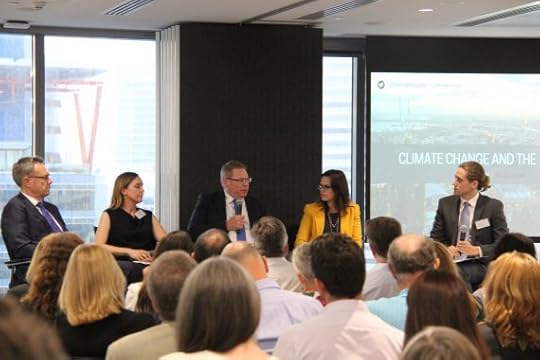
Dr Guy Debelle, Kate MacKenzie, Blair Comley PSM, Katharine Tapley, Sam Hurley.
Key Documents

Media release
CPD would like to thank Sarah Barker, Stuart Johnson and the team at MinterEllison for hosting the event, and panellists and audience who contributed to an engaged and candid discussion.
Media coverage
Reserve bank deputy governor gives speech on the economic impact of climate change, ABC 730 program, 12 March 2019
Climate change costs will have knock-on effects for interest rates, Reserve Bank warns, Laura Tingle, ABC, 12 March 2019
‘Change now or pay later’: RBA’s stark warning on climate change, Erik Bagshaw and Nick Bonyhady, Sydney Morning Herald, 12 March 2019
RBA warns of ‘abrupt, disorderly’ effects of climate change, James Fernyhough and Bo Seo, Australian Financial Review, 12 March 2019
RBA warns on climate fallout, Michael Roddan, The Australian, 12 March 2019
Climate change poses risks to Australia’s financial stability, warns RBA deputy governor, Katharine Murphy, The Guardian, 12 March 2019
The Reserve Bank has warned the challenges of climate change threaten Australia’s financial stability Rosemary Bolger, SBS News, 13 March 2019
RBA warns of threats to financial stability from climate change, Fran Kelly, ABC RN Breakfast, 13 March 2019
RBA boss calls for urgent action on climate to avoid economic calamity, Samantha Maiden, The New Daily, 13 March 2019
Related reading
Climate change and the economy, speech by RBA Deputy Governor Dr Guy Debelle, March 2019.
Climate change, speech by ASIC Commissioner John Price, June 2018
Climate horizons: scenario and strategies for managing climate risk, CPD Report, June 2018
The weight of money: a business case for climate risk resilience, APRA Executive Member Geoff Summerhayes, November 2017
CPD roundtable on directors duties, climate risks and sustainability, October 2016
Legal opinion on directors duties and climate change, Noel Hutley SC and Sebastian Hartford-Davis, October 2016
The post Climate Change and the Economy with the RBA’s Guy Debelle | PUBLIC FORUM | March 2019 appeared first on Centre for Policy Development.
Centre for Policy Development's Blog
- Centre for Policy Development's profile
- 1 follower



